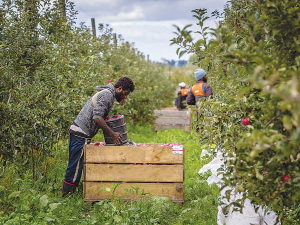Cloudy Bay Good Pick Initiative Supports RSE Workers’ Small Business Ventures
When Ben Enock came to New Zealand for vineyard work in 2007, his primary aim was to pay for his children's education at home in Vanuatu.
 The Government has announced travel dates for quarantine travel for RSE workers from Vanuatu, Samoa and Tonga.
The Government has announced travel dates for quarantine travel for RSE workers from Vanuatu, Samoa and Tonga.
As part of a programme of work to reopen borders and reconnect with the world, the Government has announced the commencement dates for quarantine free travel for Recognised Seasonal Employer (RSE) workers into New Zealand.
From 4 October, RSE workers from Vanuatu can begin arriving in New Zealand and from 12 October RSE workers from Samoa and Tonga can begin arriving.
“This will provide much needed certainty for our growers as they gear up for summer and autumn harvesting,” says Agriculture Minister Damien O’Connor.
People arriving under the scheme must meet strict health conditions, including requirements to be vaccinated with at least one dose pre-departure, the completion of a period of self-isolation on arrival, and the returning of two negative Covid tests on Day 0 and Day 5. Employers are expected to provide the self-isolation facilities.
If workers have only received one dose of the vaccine, they are expected to complete their vaccination after they arrive in New Zealand.
“Despite the challenges of a Covid world, which has constrained the number of RSE workers who could come through MIQ, the Government has remained committed to the RSE scheme,” O’Connor says.
“The horticulture sector is worth over $6 billion to New Zealand exports. Having people coming to our shores through the RSE scheme to harvest and prune is essential to us maintaining our economic recovery from Covid-19, a recovery which is very much export-led.
“We are also aware of the positive impact the scheme has on our Pacific neighbours with the benefits of the hard work done by RSE workers flowing back home from our shores.”
The commencement of quarantine free travel for RSE workers forms a pilot scheme to test systems in preparation for a broader and safe reopening of the borders.
“We will closely monitor this first stage of one-way quarantine-free travel as we want to expand eligibility for quarantine-free entry to New Zealand from these countries and Tokelau when we can be sure it is safe to do so.”
O’Connor says he wants to thank Samoa, Tonga and Vanuatu for their co-operation as well as the horticulture and viticulture sectors for their collaboration.
Up to 14,400 RSE workers normally come through New Zealand each year, with approximately 10,500 being in the country at peak harvesting times pre-Covid. As at August 2021, approximately 7,000 RSE workers were in the country.
The Meat Industry Association of New Zealand (MIA) today announced that Chief Executive Officer Sirma Karapeeva has resigned from the role.
The winners of the 2026 Hawke’s Bay/Wairarapa Dairy Industry Awards were announced at the annual awards dinner held at Copthorne Solway Park in Masterton on Thursday evening.
Environment Southland is welcoming this week’s decision by the Environmental Protection Authority (EPA) to approve the release of Blaptea elguetai, a leaf‑feeding beetle that will help control the highly invasive Chilean flame creeper.
This March, the potato industry is proudly celebrating International Women’s Day on 8 March alongside the International Year of the Woman Farmer, recognising the vital role women play across every part of the sector — from paddocks and packhouses to research, leadership, and innovation.
Fruit trader Seeka posted a record profit and returns to shareholders in 2025.
Recent weather events in the Bay of Plenty, Gisborne/Tairawhiti, and Canterbury have been declared a medium-scale adverse event.

OPINION: A mate of yours truly reckons rural Manawatu families are the latest to suffer under what he calls the…
OPINION: If old Winston Peters thinks building trade relations with new nations, such as India, isn't a necessary investment in…